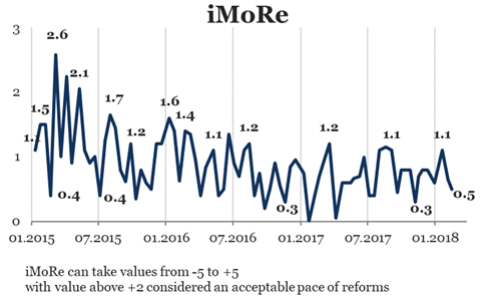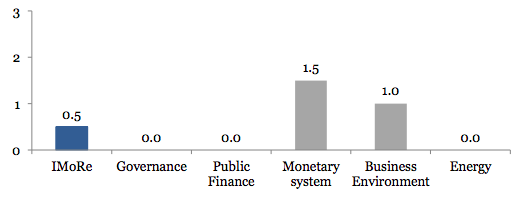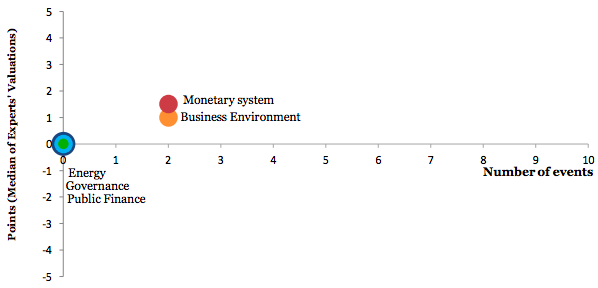Reform Index is +0.5 points for the period from January 29 – February 11, 2018 (+0.7 in the previous round on a scale of -5.0 to +5.0). Positive developments were recorded in legislation regarding the monetary system and business environment. There were no reformist legislative changes affecting governance, public finance and the energy sector.
The major event of the round is the law on audit of financial reporting and audit activity.
Chart 1. Reform Index dynamics*

Chart 2. Reform Index and its components in the current round

The major event of the release
Law on audit of financial reporting and audit activity, +1.5 points.
Qualitative audit of financial reporting makes companies transparent. This is crucial for the enterprises that attract funds from external investors, because the auditor’s report can increase the investor’s confidence in the company’s activities. This is very important for state and other socially important companies, where the state must clearly understand all the opportunities and risks associated with their activities, while these activities should be transparent and accountable.
Till present, there were actually two parallel systems in the country – audit which was carried out according to national standards, and audit carried out according to international standards. In particular, the companies that attracted funds on foreign markets, just as banks turned to international auditing companies more often. The rest were mainly audited by national standards that are less transparent to external investors. However, even an audit of international companies did not provide the quality of the findings. Meanwhile, in the summer of 2017, the well-known company PriceWaterhouseCoopers was excluded from the Register of Audit Firms that have the right to conduct bank audit due to the provision of inaccurate information on the financial and economic activities of PrivatBank.
By signing the Association Agreement with the EU in 2014, Ukraine has undertaken a commitment to harmonize the legislation on audit activity with the relevant directives of the European Parliament (2006/43 / EU, 2014/56 / EU, etc.) over a period of 3 years. Implementation of these norms encountered resistance and proceeded with certain delay, so in early 2018, the EU Delegation in Ukraine made a statement on their prompt entry into force.
Law 2258-VIII harmonises national legislation on audit activity with EU standards. Also, new requirements for the audit of financial reporting of enterprises that have public interest have been established. In particular, the law contains strengthened requirements for the auditor’s report of such enterprises, introduces obligatory rotation of the auditors.
The law also changes the regulation of audit activity. It regulates the institution of professional self-government of auditors – the body of public oversight of audit activities. The register of auditors and entities of the audit activity will be public and accessible on the official site of the Audit Chamber of Ukraine. The law also contains a list of non-audit services that an auditor of an enterprise is prohibited from providing to the same company, its subsidiaries or parent company.
The last of the above innovations has been criticized by individual audit firms. In particular, as Julia Tereschenko, KPMG Audit Director in Ukraine noted, the prohibition of non-audit services may increase the cost and complicate doing business in Ukraine.
Chart 3. Value of Reform Index components and number of events

Reform Index aims to provide a comprehensive assessment of reform efforts by Ukraine’s authorities. The Index is based on expert assessments of changes in the regulatory environment in five areas:
- Governance
- Public Finance
- Monetary system
- Business Environment
- Energy
For details please visit reforms.voxukraine.org
Attention
The author doesn`t work for, consult to, own shares in or receive funding from any company or organization that would benefit from this article, and have no relevant affiliations



